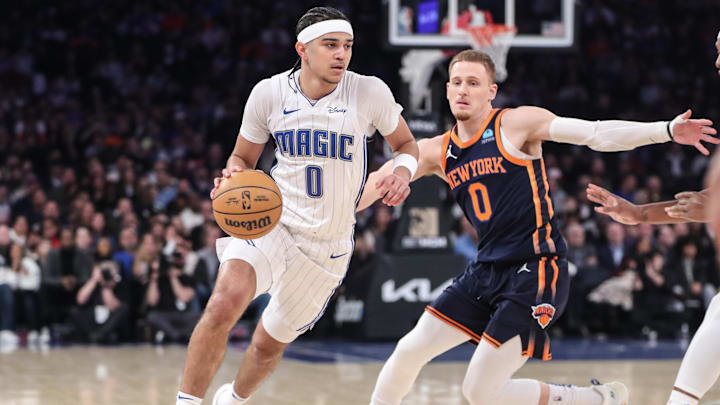Intro to the 2024 NBA Draft
The G-League Shift
Philip Rossman-Reich, Orlando Magic Daily: The Magic's needs have changed. They aren't drafting to see what talent can do. They want guys with upside. You don't want a guy who is who he is after his rookie year. You don't want that rookie year to be their best year. You want guys to continue to get better.
The Magic aren't necessarily looking for the high-upside guy. They are probably looking for someone who can help contribute to winning. The way the Magic have handled Jett Howard and the fact they have had him in the G-League. How much should that change what the Magic are doing [at the draft]?
Essentially next year, Howard is going to be a rookie. But how much should the fact that they will probably have a player who is essentially a rookie on their roster who fits a lot of the needs we know this team need as a shooting wing.
How much should that affect what the Magic do? Do the Magic look elsewhere because they know they have that rookie shooter in their back pocket?
Richard Stayman, Locked on NBA Big Board: I think this team, the thing we've seen is if you remember that stretch when everyone was down, we did not see much shooting I don't think from the Magic. One shooter is not going to fix it. One shooter doesn't solve anything.
And who knows what happens with Gary Harris?
I don't think you can go, "We have Jett Howard coming, what do we need to worry about?" I think you need to add as much depth in that regard as possible and really have somebody ideally who can just shoot but can do other things after they are blitzed?
Like Duncan Robinson obviously is the most known I think just plain shooter but he is also really good at making reads out of traps. Can they find someone who does that or just simply attacks closeouts and creates a little bit. That's where the challenge is going to be in what they look for in a shooter.
Philip: There are a lot of questions with the Magic's shooting with Gary Harris (now a 37.3 percent 3-point shooter this year) set to hit free agency. Shooting has been the biggest drawback of the Magic's offense, ranking near the bottom of the league in both percentage and attempts per game.
There are some good shooters who have had down years -- Cole Anthony is sitting 31.2 percent and Franz Wagner at 29.2 percent. But there have also been some positive signs with Paolo Banchero jumping to 36.7 percent and Jalen Suggs now better than 40 percent from deep.
One player is obviously not going to fix the Magic's shooting problems. But even internal improvement does not seem to get at it. So how do the Magic get the most of their Jett Howard pick?
I am sure you are following this trend too and I don't know how much it impacts your analysis especially as you are looking at prospects and how prospects can improve, but The Ringer just came out with that article and it builds on this point about how teams are using the G-League more than ever to develop their players.
How much does the prevalence and the use of that tool change how you slot guys? Maybe teams can take a risk on a guy and say we're going to park him in our G-League affiliate for a good chunk of the year and check in on him a year later. Does that change how we shape our big boards or mock drafts now?
Richard: I think it should. The stigma almost of they played in the G-League, they must be doing really poorly, that's always what it's been whether it's warranted or not.
They finally figured it out. For the longest time it's you only go to the G-League because you are doing poorly or you are so out of the rotation you need real run. Now it's we don't have many opportunities for you to run off screens because teams know you are going to do that and it won't help us right now. Go do that in the G-League and get some run.
That's what I think teams are doing. It's not a punishment. That's what it always feels like it has always been labeled as. I think they are using it right. It should be factored into it more instead of a draft-and-stash for example and they lose control over what is being developed. Now they have the first say in what is being brought up.
Philip: It's definitely a tool. Now we see I think a lot of teams not openly acknowledge but very much come in with a development plan of you are going to training camp with us, we're going to keep you under contract, we're not going to defer you a year . . . I think you see a lot of teams enter the season with that plan.
